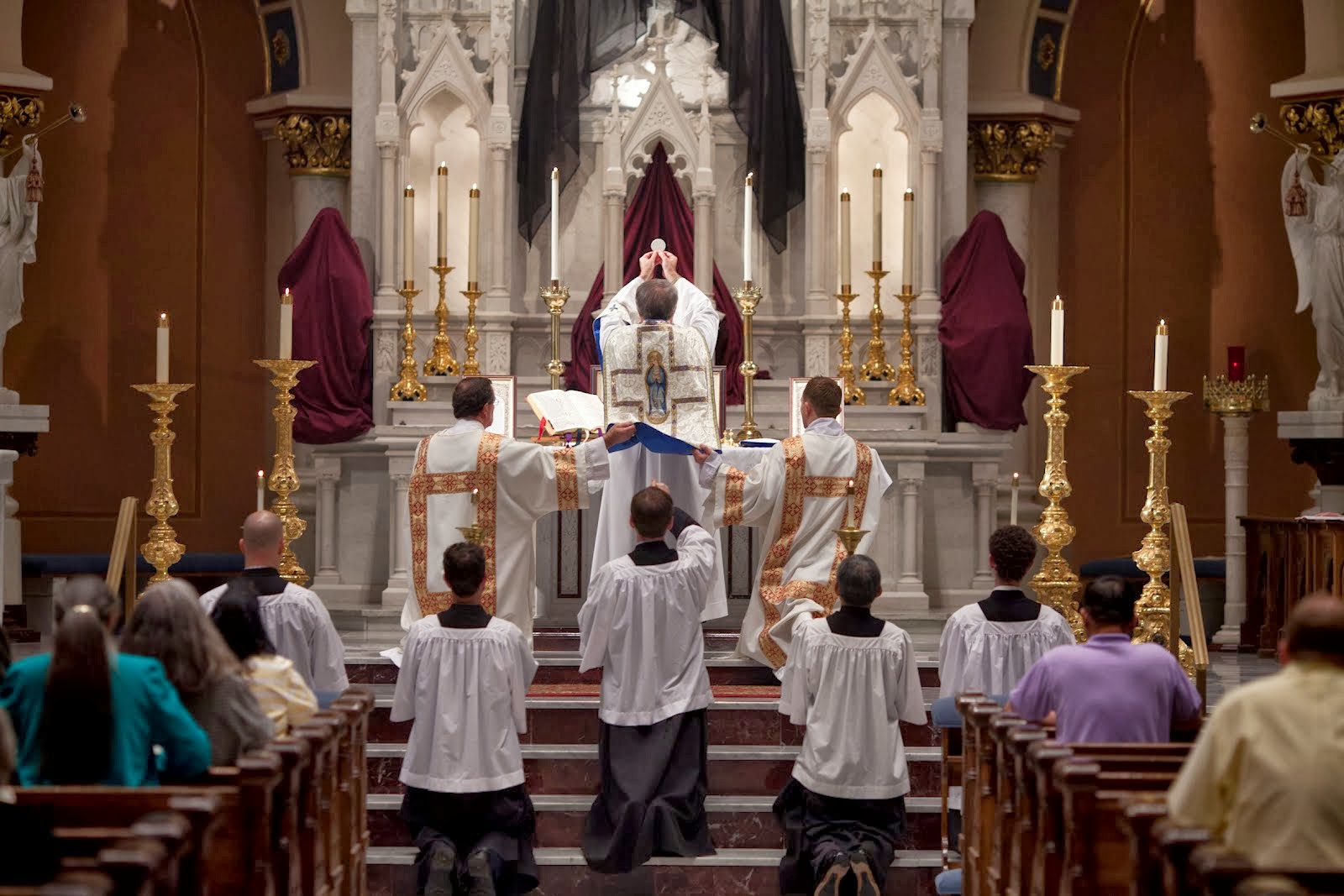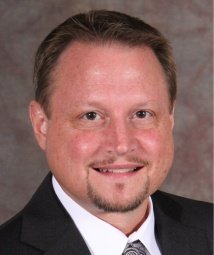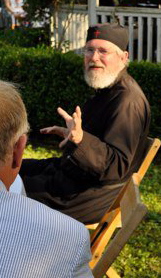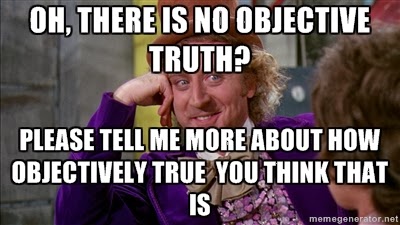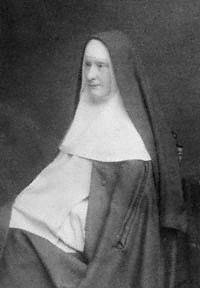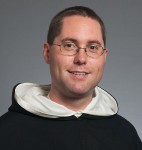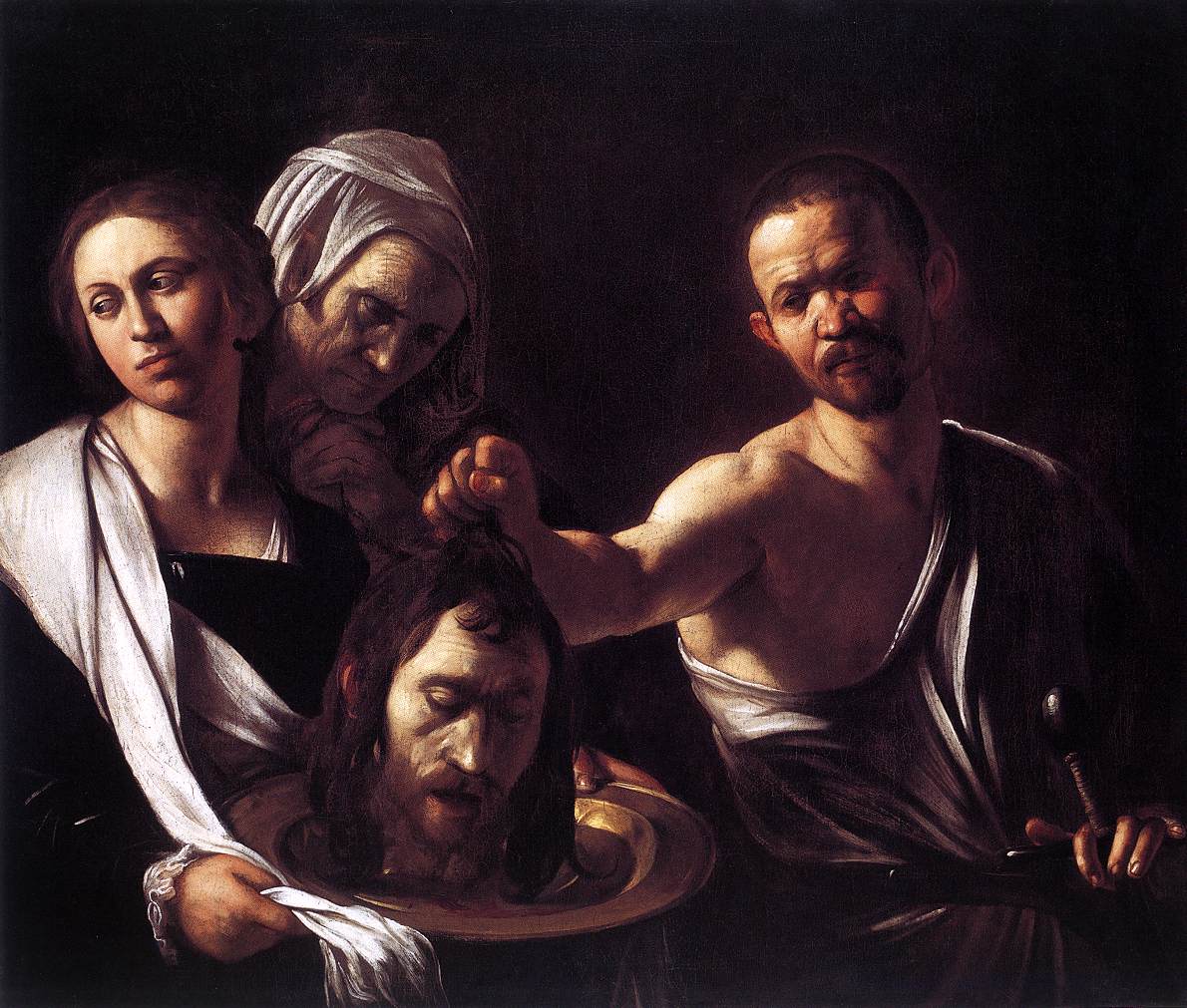“And on the day called Sunday, all who live in cities or in the country gather together to one place, and the memoirs of the apostles or the writings of the prophets are read, as long as time permits; then, when the reader has ceased, the president verbally instructs, and exhorts to the imitation of these good things. Then we all rise together and pray, and, as we before said, when our prayer is ended, bread and wine and water are brought, and the president in like manner offers prayers and thanksgivings, according to his ability, and the people assent, saying Amen; and there is a distribution to each, and a participation of that over which thanks have been given, and to those who are absent a portion is sent by the deacons.”
—Justin Martyr, I Apol. 67 (~A.D. 150-155)
(By the way, there’s a little joke in there. The Hebrew tattoo deliberately incorrectly spells God’s name. Instead of God’s name (יהוה ), it says, ויהי , translated, “And it came to pass” or “And it was so.” Of course the joke here is that people who get Hebrew tattoos really do not know how to read Hebrew at all.)
Worship, by definition, I believe, is not about us, whether we like it, or whether it entertains us. Now, what could it be about? Think. Think. Think. Nope! Nothing. De gustibus non est disputandum. Why do we go to Mass? To get to Heaven. Not to be entertained. Not that simply attending Mass will merit us anything, but as an aid and a command the Lord has given us to perform in worship of Him. It is NOT something anyone owes us, but something, very rather, we owe HIM, in justice, in gratitude, for our very lives, and all the joys therein. We owe Him.
It is NOT optional, in fact, missing Mass for less than a really good reason, ie. illness, is a sin, a mortal sin, which kills the life of grace within; if, you want to get to Heaven. Like it or not. Plain & simple truth, whether you like it or not.
Don’t want to go to Heaven? Don’t go to Mass. We ARE in radical agreement. But, don’t expect any help in the form of grace in life, though. And, just one day, just one day, actually there are many, you just might need that grace to make it through the day, another day, ONLY through grace.
From my reading, Jesus will not say to us in our particular judgment, yeah, that’s in the deal, too, “No Mass? No problem!” That’s just how I, imho, read the scriptures. Others may agree.
That, imho, again, is NOT to say we always shouldn’t offer our best: our best preaching, our best music, our best reading, our best singing, our best worship of Him. There is nothing wrong with joyful worship. There is nothing wrong with reverential worship. We can always improve. It is the very definition of fallen human beings.
And, finally, if we are to “Love one another” as He has loved us, where better to begin in charity than in the Mass, attending despite less than inspiring preaching, rote ritual, or less than angelic music, or despite, yet another collection, or perpetual fund-raising activity, festival, parish-wide garage sale, or other trivial, distracting announcement, that seem to be an ever present obstacle to profound surrender in worship to the Divine. To, in all of this, mis-worship, cry out in our heart of hearts, just like the worshiping tax collector, Lk 18:13, “God, have mercy on me, a sinner.”
-by Jim Blackburn
“In an all-too-common tragedy these days, a poorly catechized Catholic attends a worship service at a megachurch, mistakenly believing the worship service simply to be a modern, non-Catholic version of the Mass. The Catholic feels emotionally drawn to the megachurch worship service and decides Mass, in comparison, is boring. A typical view might be, “Wow, I’m being fed here like I’m not being fed at Mass.”
The American Heritage Dictionary defines megachurch as “a large, independent, usually nondenominational worship group, especially one formed as an offshoot of a Protestant church. Also called seeker church.”
“Large” is right. Among the better known megachurches are Joel Osteen’s Lakewood Church in Houston (attendance 43,500), Willow Creek Community Church near Chicago (attendance 23,000), and Rick Warren’s Saddleback Church (attendance 20,000) in my backyard in Orange County, California.
Many megachurches are known for their concert-style worship services, consisting of passionate preaching accompanied by emotionally driven music.
I often hear stories about local Catholics in my diocese who venture into one of Saddleback’s worship services—only to be “sold” on this new style of worship, and never again to return to the Catholic Mass.
“Something for Everyone”
From a superficial perspective it’s easy to see why ill-informed Catholics can be drawn in so easily. A quick visit to Saddleback’s Web site (saddleback.com) reveals a veritable menu of Sunday worship services to satisfy the taste of just about any self-indulgent seeker. For example, consider these six offerings, as described on the site:
- Worship Center Times: You’ll engage in an array of contemporary worship music and enjoy live teaching that is video cast to our other venues.
- Fuel Times: FUEL is our newest venue for young adults ages 20s to 30s (but everyone is welcome). Join us in Refinery main auditorium for live teaching, worship, food, and relationship building. All of this and more, packed into a shorter service.
- Overdrive Times: This service is filled with guitar-driven, rock-infused worship sure to amplify your experience. You’ll feel like you’re worshiping in a musical concert setting! The message will follow, video cast live from the Worship Center.
- Praise Times: This venue is filled with inspiring gospel music that will move your heart and encourage your spirit. The gospel choir will get you up off your feet in whole-hearted praise to God. Worship is followed by the video cast message.
- Terrace Cafe Times: Grab a cup of coffee and relax in this outdoor worship environment. Located on the top of the Plaza Building, the Terrace Cafe is a perfect place to bring your friends for fellowship and a casual worship experience.
- Traditions Times: Enjoy a warm, small church community and a traditional approach to worship through hymns and choruses.
Now, each of these forms of worship can be perfectly fine. The problem arises with the gross misconception that such worship is in any significant way comparable to the Catholic Mass. The truth is there really is no comparison at all.
The First Lord’s Supper
The evening before he was crucified, Jesus and the apostles shared a meal. At the Last Supper Jesus very plainly explained to the apostles how he wanted them to worship: He took bread, and when he had given thanks he broke it and gave it to them, saying,
“This is my body which is given for you. Do this in remembrance of me.” And likewise the cup after supper, saying, “This cup which is poured out for you is the new covenant in my blood.” (Lk 22:19-20)
These words must have been quite enlightening to the apostles, as they finally understood what Jesus meant when he said, “He who eats my flesh and drinks my blood has eternal life, and I will raise him up at the last day” (Jn 6:54).
The apostles also understood in Jesus’ words both the authority and the commandment to “do” perpetually in worship what Jesus had just instituted: the Eucharist.
The Day of Obligation
The apostles went on to teach others this sacred, God-instituted form of worship. This is evident is Paul’s words to the Church at Corinth:
“For I received from the Lord what I also delivered to you, that the Lord Jesus on the night when he was betrayed took bread, and when he had given thanks, he broke it, and said, “This is my body which is for you. Do this in remembrance of me.” In the same way also the cup, after supper, saying, “This cup is the new covenant in my blood. Do this, as often as you drink it, in remembrance of me.” For as often as you eat this bread and drink the cup, you proclaim the Lord’s death until he comes.”” (1 Cor 11:23-26)
Paul was not at the Last Supper, so he undoubtedly received this from the Lord through the other apostles. And in this passage we read that he has already delivered it himself to the Church at Corinth.
Scripture reveals that the Eucharist was celebrated on Sundays: “On the first day of the week, when we were gathered together to break bread . . .” (Acts 20:7). That the celebration took place on Sunday makes sense because Jesus was resurrected on that day (Mk 16:9).
Down through history, the Church Fathers attest that the Eucharist has been the constant and most sacred form of authentic Christian worship. In the Liturgy of the Eucharist, the Catholic Church continues this form of worship and obliges Catholics to participate.
The authority to oblige Catholics in such a way was endowed to the Church by Jesus Himself. He said first to Peter and later to all of the apostles, “whatever you bind on earth shall be bound in heaven and whatever you loose on earth shall be loosed in heaven” (Mt 16:19, 18:18).
The Church has always recognized in these words the authority to enact disciplinary laws which the faithful must follow. The Catechism of the Catholic Church explains:
The power to “bind and loose” connotes the authority to absolve sins, to pronounce doctrinal judgments, and to make disciplinary decisions in the Church. Jesus entrusted this authority to the Church through the ministry of the apostles and in particular through the ministry of Peter . . . (CCC 553)
Today the obligation to attend the Mass is found in the Code of Canon Law: “Sunday, on which by apostolic tradition the paschal mystery is celebrated, must be observed in the universal Church as the primordial holy day of obligation . . . On Sundays and other holy days of obligation, the faithful are obliged to participate in the Mass” (CIC 1246 §1–1247).
Symbol or Reality?
Not long ago, Rick Warren announced, “We’re adding the Lord’s Supper . . . to 4:30 pm and 6:30 pm Sunday evening services every week!”
Some people have wondered whether “the Lord’s Supper” at Saddleback Church is the authentic Eucharist. The answer is no. The power and authority to consecrate the Eucharist has never been available to just anyone; it has always been necessary to be appointed by one of the apostles or their successors. Luke provides evidence of this: “[T]hey [Paul and Barnabas, in this case] had appointed elders for them in every church . . .” (Acts 14:23). As does Paul: “This is why I left you [Titus] in Crete, that you might amend what was defective, and appoint elders in every town as I directed you . . .” (Ti 1:5).
The term “elders” in these passages is translated from the Greek word presbyterous, from which we derive the English word priest. It is clear in the passages just cited that priests were necessarily appointed in every Church. In part, this was for the valid consecration of the Eucharist.
Since megachurches like Saddleback Church do not have priests ordained by successors of the apostles (i.e., Catholic bishops), they do not have the power or the authority necessary to consecrate the Eucharist changing its substance into the body and blood of Jesus.
Also, I’m not aware of any megachurches that recognize the life-giving presence of Jesus in the Eucharist, for Catholics the “source and summit” of the faith. In describing its Lord’s Supper, Saddleback Church’s Web site states: “The elements of bread and wine or juice are symbols of Christ’s broken body and shed blood. Communion is not a means of salvation.”
Mass Is Not Optional
There is no comparison between a modern megachurch worship service— however entertaining it might be—and the Eucharist instituted by Jesus. A person should never mistake such megachurch worship as any sort of alternative to the Mass. And, if he’s a Catholic, he must never neglect his obligation to participate in the Mass.
If a Catholic wishes to indulge in megachurch worship, and he can do so without endangering his own faith or scandalizing others, he is not explicitly forbidden from doing so. Even so, he cannot licitly participate in a megachurch communion service. This is forbidden by the Code of Canon Law: “Catholic ministers administer the sacraments licitly to Catholic members of the Christian faithful alone, who likewise receive them licitly from Catholic ministers alone . . . ” (844 §1). (Aka, “inter-communion”.)
The bottom line is this: Jesus didn’t instruct the apostles to perpetuate megachurch-style worship services, nor did He indicate that such worship would be life-giving. But He did institute the Eucharist, commanded the apostles to perpetuate it, and promised life to those who participate in it. Don’t we owe it to Him to worship as He commanded?”
Love,
Matthew

